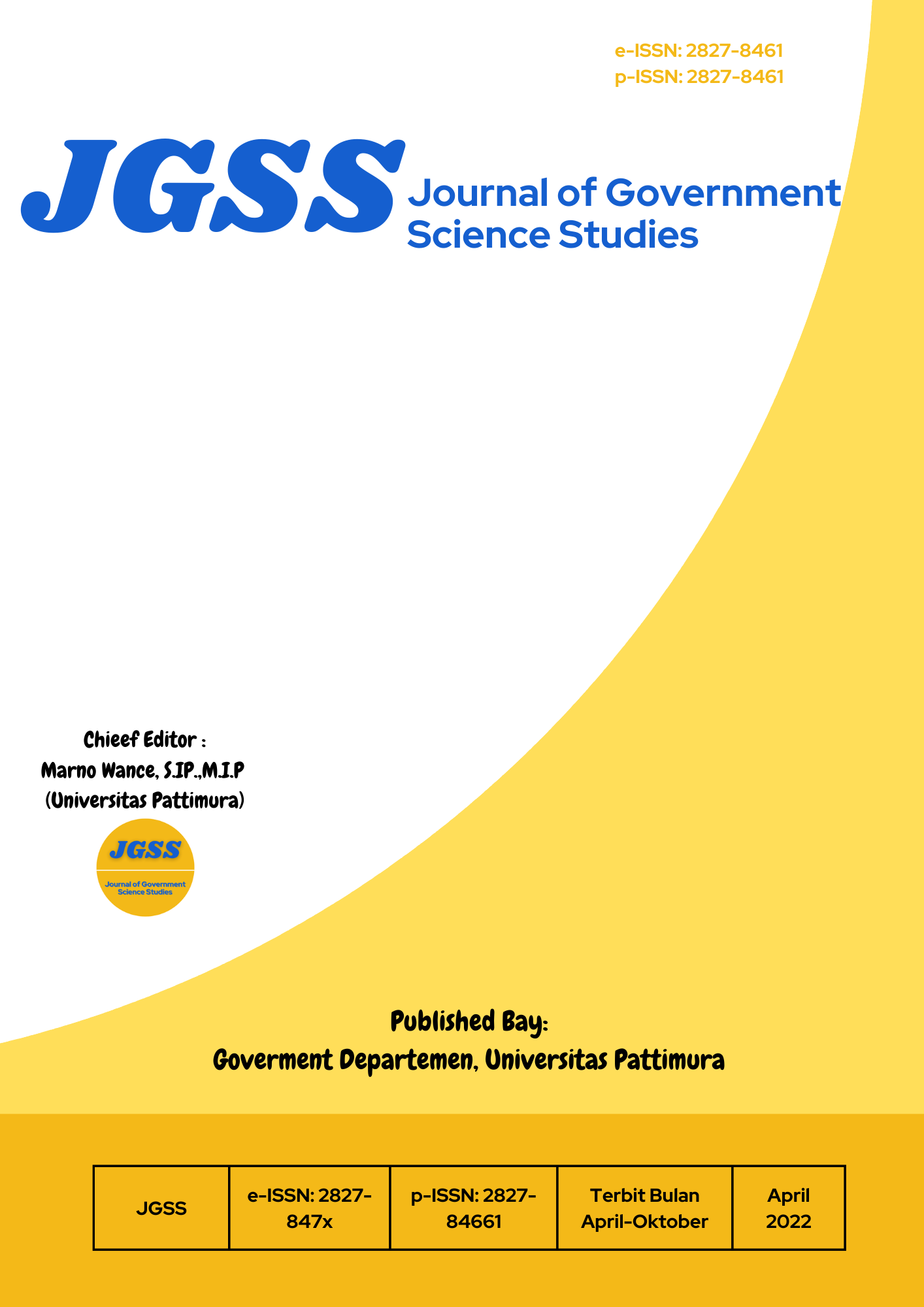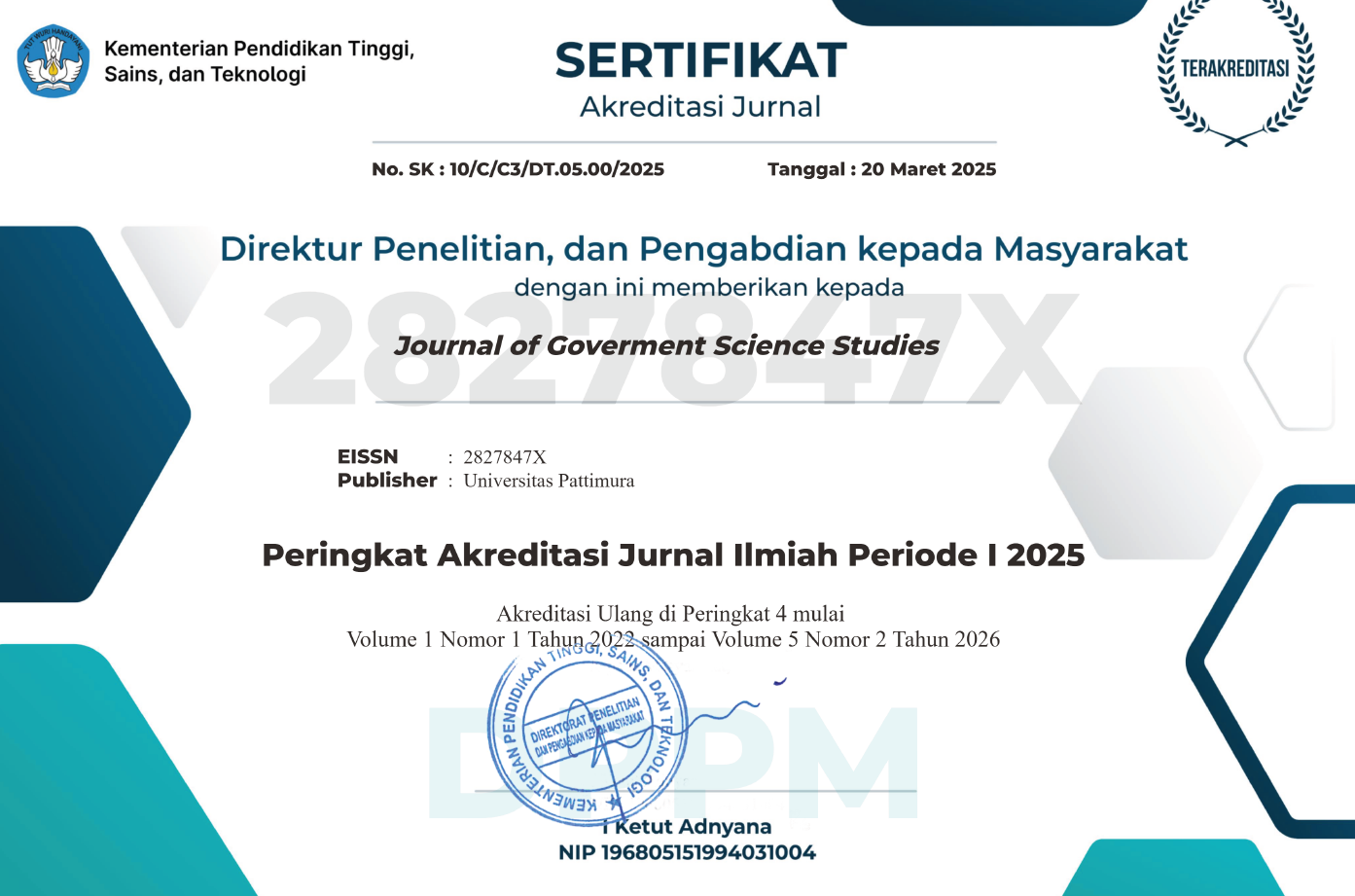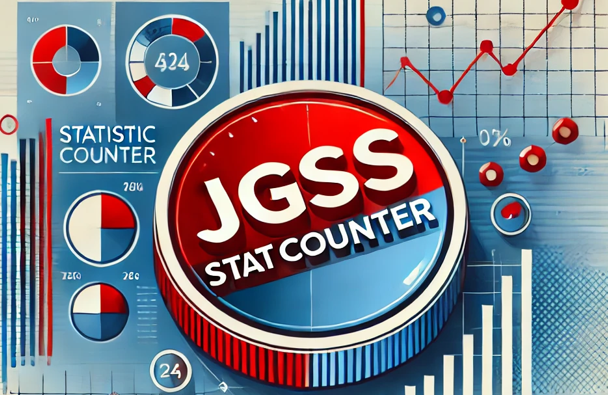Revitalizing the Deliberative Function of Political Parties within Indonesia’s Substantive Democracy
Abstract
In the last two decades, discussions surrounding deliberative democracy have significantly increased the rational dialogue, equitable participation, and the cultivation of reflective public opinion in the realm of political decision-making. Nonetheless, the current academic literature has largely ignored the role of political parties as institutional actors that bridge the gap between the government and society. This article addresses this oversight by critically examining the substantive role of political parties within the context of deliberative democracy, along with proposing avenues for institutional reform aimed at fostering a more inclusive democratic process. Through a comprehensive analytical method of literature review and cross-country comparisons, this study investigates the deliberative capacities of political parties in the United States, Europe (with particular emphasis on Germany and Scandinavia), and Indonesia. The findings indicate that European political parties have been relatively successful in integrating public discourse forums into their internal frameworks, whereas in the United States, the process of deliberation is frequently obstructed by ideological polarization and economic hegemony. On the other hand, Indonesia encountered patronage politics, weak institutionalization, and a transactional political culture as their main challenges. The study concludes that the absence of a robust internal deliberative infrastructure substantially contributes to the crisis of party representation. This research emphasises on reintegrating the role of political parties as facilitators of public discourse, rather than relegating them to the status of mere electoral machines. Strategic recommendations include the implementation of internal structural reforms, the development of idea-driven party cadres, and the fostering of stronger partnerships with civil society to enhance substantive democracy.
Downloads
References
Achen, C. H., & Bartels, L. M. (2017). Democracy for realists: Why elections do not produce responsive government. Princeton, NJ: Princeton University Press.
Antony, A., Dewi, M. C., & Louis, J. E. (2025). Building deliberative democracy in Indonesia: Democracy future and the future of democracy. Jurnal Kajian Pembaruan Hukum, 5(1), 1-26. https://doi.org/10.19184/jkph.v5i1.53689.
Arrow, K. J. (2012). Social choice and individual values (3rd ed.). New Haven, CT: Yale University Press.
Aspinall, E., & Berenschot, W. (2019). Democracy for sale: Elections, clientelism, and the state in Indonesia. Ithaca, NY: Cornell University Press. https://doi.org/10.7591/9781501732997.
Aspinall, E., & Mietzner, M. (2019). Indonesia’s democratic paradox: Competitive elections amidst rising illiberalism. Bulletin of Indonesian Economic Studies, 55(3), 295-317. https://doi.org/10.1080/00074918.2019.1690412.
Aylott, N., & Bolin, N. (2023). Shifting perceptions of intra-party democracy: Leader selection in the Swedish Liberal Party. Frontiers in Political Science, 5, Article 1070269. https://doi.org/10.3389/fpos.2023.1070269.
Bächtiger, A., Dryzek, J. S., Mansbridge, J., & Warren, M. E. (2018). Deliberative democracy: An introduction. In A. Bächtiger, J. S. Dryzek, J. Mansbridge, & M. E. Warren (Eds.), The Oxford handbook of deliberative democracy (pp. 1–42). Oxford University Press. https://doi.org/10.1093/oxfordhb/9780198747369.013.1.
Berenschot, W. (2018). The political economy of clientelism: A comparative study of Indonesia’s patronage democracy. Comparative Political Studies, 51(12), 1563-1593. https://doi.org/10.1177/0010414018758756.
Bertelsmann Stiftung. (2024). BTI 2024 country report: Indonesia. Gütersloh: Bertelsmann Stiftung. https://bti-project.org/en/reports/country-report/IDN.
Bevan, S., Borghetto, E., & Seeberg, H. (2023). Do different parties respond to different problems? A comparative study of parliamentary questions across multiple countries. Journal of European Public Policy, 31(7), 1856-1878. https://doi.org/10.1080/13501763.2023.2193583.
Braun, V., & Clarke, V. (2019). Reflecting on reflexive thematic analysis. Qualitative Research in Sport, Exercise and Health, 11(4), 589–597. https://doi.org/10.1080/2159676X.2019.1628806.
Budge, I. (2000). Deliberative democracy versus direct democracy: Party and parliamentary strengths and constitutional reform in comparative perspective. In M. Saward (Ed.), Democratic innovation: Deliberation, representation and association (pp. 162-178). London: Routledge.
Burke, E. (2009). Reflections on the Revolution in France. Oxford, UK: Oxford University Press.
Christiano, T. (2018). The rule of the many: Fundamental issues in democratic theory. New York, NY: Routledge.
Cohen, J. (1989). Deliberation and democratic legitimacy. In A. Hamlin & P. Pettit (Eds.), The good polity: Normative analysis of the state (pp. 17–34). Oxford, UK: Blackwell.
Damanik, E. R., Farina, T., & Satriya, N. (2025). Krisis partisipasi publik dalam pembentukan Undang-Undang. J-Innovative: Journal of Social Science Research and Development, 5(2), 45-58. https://j-innovative.org/index.php/Innovative/article/download/18664/12669/33611.
Dewey, J. (2024). Democracy and education: An introduction to the philosophy of education (N. Tampio, Ed.). New York, NY: Columbia University Press. (Original work published 1916).
Diamond, L. (2019). Ill winds: Saving democracy from Russian rage, Chinese ambition, and American complacency. New York, NY: Penguin Press.
Dryzek, J. S. (2015). Deliberative democracy and beyond: Liberals, critics, contestations. Oxford, UK: Oxford University Press.
Dryzek, J. S., & List, C. (2003). Social choice theory and deliberative democracy: A reconciliation. British Journal of Political Science, 33(1), 1-28. https://doi.org/10.1017/S0007123403000012.
Elo, S., & Kyngäs, H. (2008). The qualitative content analysis process. Journal of Advanced Nursing, 62(1), 107–115. https://doi.org/10.1111/j.1365-2648.2007.04569.x.
Flinders, M. V., & Wood, M. (2015). When politics fails: Hyper-democracy and hyper-depoliticization. New Political Science, 37(3), 363-381. https://doi.org/10.1080/07393148.2015.1056431.
Freedom House. (2024). Freedom in the World 2024: Indonesia. Washington, DC: Freedom House. https://freedomhouse.org/country/indonesia/freedom-world/2024.
Fukuyama, F. (2022). Liberalism and its discontents. New York, NY: Farrar, Straus and Giroux.
Gherghina, S., & Jacquet, V. (2023a). Why political parties use deliberation: A framework for analysis. Acta Politica, 58(3), 495-511. https://doi.org/10.1057/s41269-022-00232-z.
Gherghina, S. (Ed.). (2023b). Political parties and deliberation: From challenges to practices. Acta Politica, 58(1), 1-13. https://doi.org/10.1057/s41269-023-00294-7.
Goldberg, S. (2021). Just advisory and maximally representative: A conjoint experiment on non-participants’ legitimacy perceptions of deliberative forums. Journal of Deliberative Democracy, 17(1), 56-75. https://doi.org/10.16997/jdd.973.
Gülzau, F., & Lamping, W. (2022). Democratic innovations in comparative perspective: The case of deliberative forums in Scandinavia. Scandinavian Political Studies, 45(1), 56-74. https://doi.org/10.1111/1467-9477.12197.
Gutmann, A., & Thompson, D. (2004). Why deliberative democracy? Princeton, NJ: Princeton University Press.
Habermas, J. (1996). Between facts and norms: Contributions to a discourse theory of law and democracy (W. Rehg, Trans.). Cambridge, MA: The MIT Press.
Hadiz, V. R. (2017). Islamic populism in Indonesia and the Middle East. Cambridge, UK: Cambridge University Press.
Hendrawan, A., Berenschot, W., & Aspinall, E. (2021). Parties as pay-off seekers: Pre-electoral coalitions in a patronage democracy. Electoral Studies, 69, 102238. https://doi.org/10.1016/j.electstud.2020.102238.
Judijanto, L., Mulyapradana, A., & Hidayati, U. (2024). Analysis of the effect of public administration transparency on public trust in Indonesia. Sciences du Nord Humanities and Social Sciences, 1(2), 69-76. https://doi.org/10.58812/snhss.v1i2.27.
Jurnal Trias Politika. (2025). Challenges of Indonesian democracy post-2024 election. Jurnal Trias Politika, 9(1), 138-152. https://www.journal.unrika.ac.id/index.php/jurnaltriaspolitika/article/download/7531/pdf.
Katz, R. S., & Mair, P. (2018). Democracy and the cartelization of political parties. Oxford, UK: Oxford University Press.
Knight, J., & Johnson, J. (1994). Aggregation and deliberation: On the possibility of democratic legitimacy. Political Theory, 22(2), 277-296. https://doi.org/10.1177/0090591794022002004.
Landemore, H. (2020). Open democracy: Reinventing popular rule for the twenty-first century. Princeton, NJ: Princeton University Press.
Levitsky, S., & Ziblatt, D. (2018). How democracies die. New York, NY: Crown.
Macedo, S. (Ed.). (1999). Deliberative politics: Essays on democracy and disagreement. New York: Oxford University Press.
Madison, J. (2001). The Federalist No. 10. In C. Rossiter (Ed.), The Federalist Papers (pp. 77-84). New York, NY: Signet Classics. (Original work published 1787).
Manin, B. (2017). The principles of representative government. Cambridge, UK: Cambridge University Press.
Mardiyanta, A. (2013). Restore public trust through deliberative public policy formulation. Bisnis & Birokrasi: Jurnal Ilmu Administrasi dan Organisasi, 20(1), Article 2. https://doi.org/10.20476/jbb.v20i1.1861.
Mill, J. S. (1991). Considerations on representative government. Buffalo, NY: Prometheus Books. (Karya asli diterbitkan 1861).
Miller, D. (1992). Deliberative democracy and social choice. Political Studies, 40(1), 54-67. https://doi.org/10.1111/j.1467-9248.1992.tb01814.x.
Mounk, Y. (2018). The people vs. democracy: Why our freedom is in danger and how to save it. Cambridge, MA: Harvard University Press.
Muhtadi, B. (2019). Vote buying in Indonesia: The mechanics of electoral bribery. Singapore: Palgrave Macmillan.
Norris, P., & Inglehart, R. (2019). Cultural backlash: Trump, Brexit, and authoritarian populism. Cambridge, UK: Cambridge University Press.
Owen, D., & Smith, G. (2015). Deliberation, democracy, and the systemic turn. Journal of Political Philosophy, 23(2), 213-234. https://doi.org/10.1111/jopp.12054.
Rachmayani, I., & Warganegara, A. (2023). Kelembagaan partai dan patronase politik: Studi pada PDIP. Moderat: Jurnal Ilmiah Ilmu Pemerintahan, 9(2), 140-158. https://doi.org/10.25157/moderat.v9i2.2761.
Rahat, G., & Kenig, O. (2018). From party politics to personalized politics? Party change and political personalization in democracies. Oxford, UK: Oxford University Press.
Ramis-Moyano, D. (2025). Mini-publics and party ideology: Who commissioned the deliberative wave in Europe? Journal of Deliberative Democracy, 21(1), 1-12. https://doi.org/10.16997/jdd.1559.
Riker, W. H. (1988). Liberalism against populism: A confrontation between the theory of democracy and the theory of social choice. Long Grove, IL: Waveland Press.
Sánchez Medero, G., & Rodríguez Virgili, J. (2025). Diagnosis of the digitalization of intraparty democracy in Southern European political parties. Frontiers in Political Science, 7, Article 1580687. https://doi.org/10.3389/fpos.2025.1580687.
Saward, M. (2017). The representative claim. Oxford, UK: Oxford University Press.
Setiawan, Y., Suhardi, M., Murtikusuma, R. P., & Yatni, S. H. (2025). Analisis kritis terhadap implementasi Undang-Undang Cipta Kerja dalam perspektif hak asasi manusia dan prinsip keadilan sosial di negara hukum. Yurisdiksi: Jurnal Ilmu Hukum dan Humaniora, 16(1), 77-92. https://jurnalp4i.com/index.php/yurisdiksi/article/view/5119.
Snyder, H. (2019). Literature review as a research methodology: An overview and guidelines. Journal of Business Research, 104, 333-339. https://doi.org/10.1016/j.jbusres.2019.07.039.
Törnquist, O. (1999). Politics and development: A critical introduction. London: SAGE Publications.
Törnquist, O. (2006). Assessing Democracy from Below: A Framework and Indonesian Pilot Study. Democratization, 13(2), 227-255. https://doi.org/10.1080/13510340500523937.
Urbinati, N. (2019). Me the people: How populism transforms democracy. Cambridge: Harvard University Press.
V-Dem Institute. (2024). Democracy report 2024: Democracy at risk? Gothenburg: University of Gothenburg. https://www.v-dem.net.
Copyright (c) 2025 Hamka Hendra Noer

This work is licensed under a Creative Commons Attribution-ShareAlike 4.0 International License.








.png)





